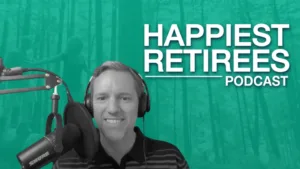“I was happier when I was 15 years old and had $5 in my pocket than I was when I was working and had several thousand bucks in the bank,” says Jim. “I’ve retired, and now I spend my time renovating an old house and walking the beach with my fishing rod. I have a one-day-a-week side-gig, and my nest egg is still growing. I may not be the wealthiest person in my neighborhood, but I bet I’m the happiest,” he exclaims.
Jim retired when he was 51. Just 51 years old!
These are the stories I love the most — the ones about people who start living the best years of their life sooner than planned.
I’ve heard from soon-to-be and early retirees about their reasons for leaving the workforce. Some may be beyond our control, such as layoffs (or the more modern, euphemistic term, “right-sizing”). But others are based on personal choice (read as job dissatisfaction).
I’ve written recently about the “I Quit Economy,” where we’ve seen a mass exodus of workers. From April through June of 2021, the Bureau of Labor Statistics (BLS) reported that almost 11.5 million Americans voluntarily left their jobs. Now, these numbers are based on individuals who are typically headed to a different job opportunity or to start their own venture. These numbers do not include those retiring. Imagine if we had a full measure of those who also chose to leave their careers behind!
While the BLS just reports the numbers and not the “why,” it’s hard to ignore the impact that COVID-19 has wrought over the past 18 months. It feels like our society has taken a collective step back from the normal rush of everyday life, and taken the time to ask ourselves, “Is this the best use of my time? Is this how I want to spend my time?”
Clearly, for many, the answer is, “No.” But what does it take for folks to pull the trigger on retirement?
What I’ve found is that there are a handful of clear-cut, common threads when folks punch out of their jobs for the last time and into early retirement. Let’s take a walk through them.
Drive time
Are you taxed to the limit on your drive to and from the office? (I’m looking at you, Atlanta.)
If your commute is a long haul, you know what a grind it is. We can agree that long drive times to and from work cause unhealthy physical and mental stress. But did you know that grueling commutes stress your marriage, too? According to at least one study, people who spend more than 45 minutes getting to and from work are 40% more likely to get a divorce.
Think about that, and it makes sense. Time in the car equals time you’re away from home and not able to engage with your spouse and family. And let’s face it — few of us come home with bells on after being stuck in gridlock.
Rollercoaster schedule
This one is for the folks who are burning the candle at both ends. A work schedule that isn’t actually a schedule at all can be unhealthy — mentally and physically.
When my wife, Lynne, and I were newlyweds, she worked as a nurse. Her job required her to split workweeks between day and night shifts and sometimes be on call. You can imagine that this schedule was difficult. A recent study of nearly 30,000 food and retail workers found that employees who work full or partially on-call schedules were significantly less likely to report feeling happy and were more likely to sleep poorly.
But the reality is that some businesses require shift work and couldn’t meet customers’ needs without it. If you’re in such an industry and can’t escape a rollercoaster workweek, my advice is to make an honest assessment of the impact of the ride on your health and happiness.
No love lost
Do you love your job — like, really love it? Or, are you simply grinding out the days, months and years to collect a paycheck?
No job is perfect in every way. It is, of course, called work. But there should be some level of excitement and challenge (and fun) to make your day enjoyable. We all want to continue learning and developing professionally. When we stop growing, we start to stagnate. And that’s the breeding ground for work dissatisfaction and disengagement.
Combine that with the feeling that your work is not having an impact and doesn’t matter in the grand scheme of things, and you could be well on your way to work fatigue and burnout. If you’re reading this and nodding your head, it’s likely time to look for fulfillment elsewhere.
Lack of recognition
Speaking of appreciation, when is the last time you got a good pat on the back for a job well done?
Recognition is critical at the workplace, and we all want to be appreciated for our contributions. Getting a paycheck doesn’t always fit the bill. True fulfillment often requires a direct personal touch, like an acknowledgment or a thank you from up the ladder.
If positive feedback and praise are scarce in your office, maybe it’s time to reconsider your work life. Retirement is fertile ground to use your talents and experience in new and fulfilling ways, like consulting and volunteering.
Capped out
How’s your financial growth potential?
Many jobs come with nonnegotiable caps on salary, particularly for corporate professionals nearing the traditional retirement age. If you’ve been at it for a while, you might find yourself in this exact position.
Without the possibility of bonuses or cost-of-living allowances, you may have topped out. Worse yet, many employees in this situation can feel the proverbial target on their backs if their company decides to lay off folks (ahem, “right-size”). All in all, it’s not a good place to be.
If your work life has become a day-by-day slog to make money that’s just adding to an already healthy nest egg, think of exiting stage left.
And know this: If you’re not ready for full retirement, you can always dip a toe in by entering what I call the Retirement Gray Zone, a place where you’re not fully working or fully retired. Maybe this looks like consulting or entering a part-time position.
I’m a huge advocate for retiring sooner — so much so that I host a podcast called “Retire Sooner.” In fact, the podcast explores the ins and outs of retiring early. And I’ve written a new book on the topic, “What the Happiest Retirees Know,”that’s coming out on Oct. 26.
I also advise clients on achieving true financial stability, but I’m not big on wealth for the sake of wealth. What I’m a huge fan of is wealth for the sake of true happiness. So, if your job creates more heartburn than satisfaction, think about a fresh chapter. If you could start living your best life as a happy, early retiree right now, why wait?
Read the AJC Article here.
This information is provided to you as a resource for informational purposes only and is not to be viewed as investment advice or recommendations. This information is being presented without consideration of the investment objectives, risk tolerance, or financial circumstances of any specific investor and might not be suitable for all investors. This information is not intended to, and should not, form a primary basis for any investment decision that you may make. Always consult your own legal, tax, or investment advisor before making any investment/tax/estate/financial planning considerations or decisions.










